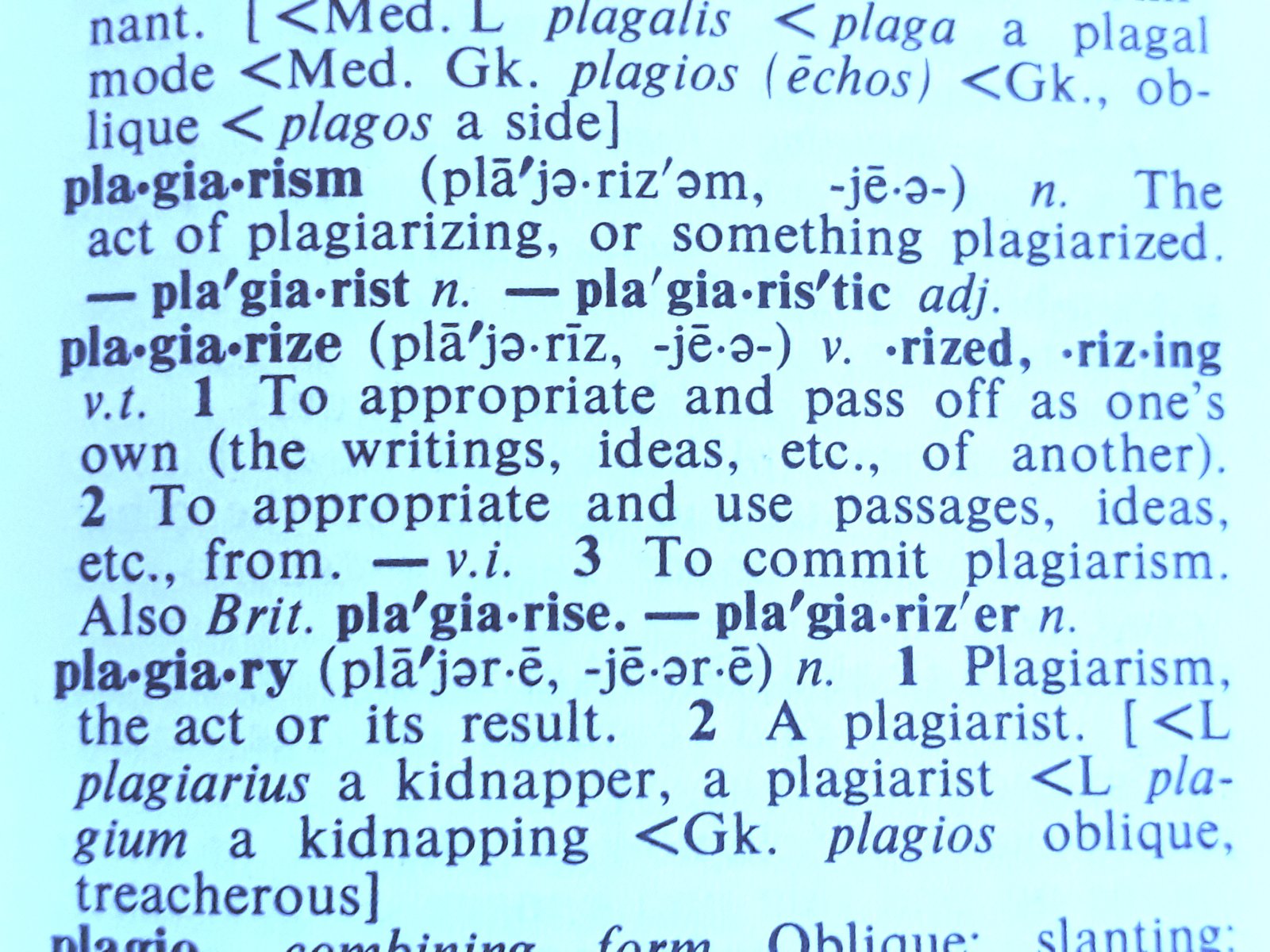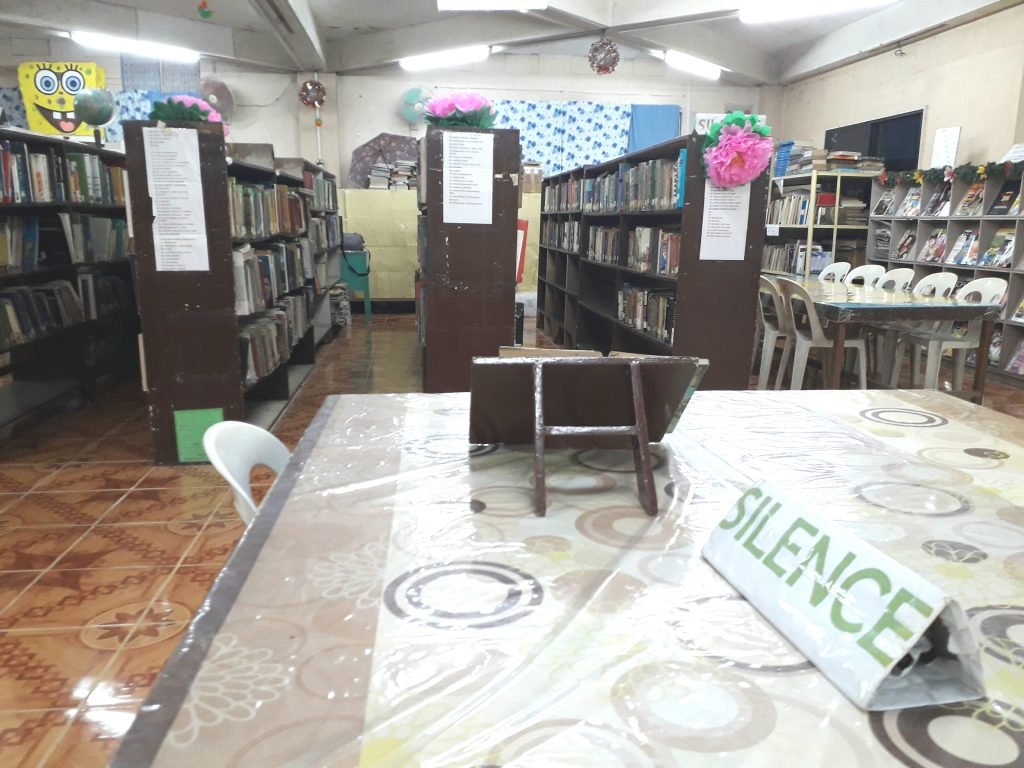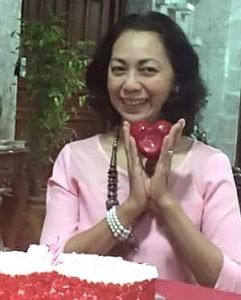To plagiarize is to appropriate and pass off as one’s own of another’s writings, ideas, etc. (Funk & Wagnalls). The problem of plagiarism has been around probably since man began producing literary works. For the etymology of the word, “plagiarism” has its roots in the Latin plagium a kidnapping which has its roots, in turn, in the Greek plagios treacherous, crooked. If you have been guilty of plagiarism you’re in the company of writing greats such as Oscar Wilde, singer-composer George Harrison, Human Rights hero Martin Luther King, and William Shakespeare. Huh? Is this true? Even the Bard? Ah well, that’s what they say. Shakespeare purportedly borrowed the writings of Raphael Holinshed. Were the above just inspired? Or influenced by those whose works they admired? Well, it is possible to get inspiration from those before us and whom we idolize, yet, it is another thing to get caught using exactly the same wordings.
“Borrowing” is not a very nice thing to do. *Pout* It is lazy, ill-mannered, inconsiderate and downright embarrassing when the fact is made public. Centuries after Bill left this earth for another world yonder, the origin of his works is still being debated. Shakespeare may have gone on to become one of the biggest literary figures in history, but questions are raised about his authenticity. How can his spirit rest in deep slumber? “Out, damned spot!” Don’t take to heart T.S. Eliot’s essay where he wrote that “Immature poets imitate, mature poets steal; bad poets deface what they take, and good poets make it into something better, or at least something different.” Stealing is stealing.
When I was in grade school, my parents bought me a set of Colliers Encyclopedia. Remember, this was in the pre-computer, hence, pre-internet era and this was at a time when most households would have a set of encyclopedia proudly sitting on a bookshelf. With Volume 24 housing “Bibliography – Index”, I learned how to research on any subject in my assignment. This skill would serve me very well in High School and, more so, in College when some assignments needed more intensive research and we classmates would have to line up at the library for books and wrestle with voluminous ones in the dusty recesses of the hall. The generation now never had it so easy! And this is where Houston has a problem.
The internet is an amazingly endless source of information to everybody! Literally, everybody. Anyone who can can and will Google any desired subject, and voila! a whole array of data without wrestling with dusty volumes of Colliers.
This is where the danger lies. Don’t be fooled into thinking that your work will be buried in the uncountable pile of data on the web. Conversely, never think that anybody can “borrow” another’s work, pass it off as one’s own, and not get caught. Plagiarism checker, hello!!! Someone I know lost her newspaper column when the editor discovered that she had been lifting much of her material verbatim from web sources.
Let’s learn our lesson from the backlash received by the Philippines’ Senator Vicente Sotto III whose speech on Reproductive Health in 2012 was said to have parts lifted from Robert F. Kennedy’s “The Day of Affirmation” speech delivered on June 6, 2966 in South Africa. Although that of Sotto’s was in Tagalog, this was deemed to be a literal translation of Kennedy’s English. Below are some of those lines.
Few will leave the greatness to bend history Iilan ang magiging dakila sa pagbali ng kasaysayan
But each of us can work to change a small portion of the events Subalit bawat isa sa atin ay maaaring kumilos gaano man kaliit, para ibahin ang takbo ng mga pangyayari
It is from numberless diverse acts of courage such as these Ang mga hindi mabilang na iba’t ibang galaw ng katapangan at panindigan
That the belief that human history is thus shaped Ang humuhubog sa kasaysayan ng sangkatauhan
When someone blew the whistle on the senator’s speech, RFK’s daughter Kerry issued a statement on this matter on November 9, 2012 that mentioned “his unethical, unsanctioned theft of Robert Kennedy’s intellectual property.” (GMAnetwork.com) Sotto in response to this said, “I made a disclaimer. I said that these are not my words but of others in the know on the subjects birth control, contraceptives and abortion.” For him, translating a work is not copying. Sotto was also previously charged with plagiarism for appropriating online works of bloggers for his anti-RH bill speeches. (Neal H. Cruz, opinioninquirer.net; www.philstar.com) Of course, netizens gave their varied reactions to this incident. Speeches are under Intellectual Property and Part IV, the Law on Copyright, of RA 8293 makes provisions for these.
Meanwhile, in the United States, First Lady Melania Trump had her own share of this controversy via a 2016 speech made during a Republican National Convention which allegedly had parts lifted from Michelle Obama’s 2008 speech. Then, came a new campaign this year – Be Best – to promote well-being and counter opioid addiction and cyber bullying said to have shades of Michelle Obama’s Be Better catchphrase. She said, “As we all know, social media can both positively and negatively affect our children, but too often it is used in negative ways.” (bbc.co.uk) Very ironical considering that Mrs. Trump’s initiative includes the White House website where parents are directed to “Talking with Kids About Being Online, a booklet by First Lady Melania Trump and the Federal Trade Commission.” The same is almost identical to a 2014 online publication by the FTC “Net Cetera-Chatting with Kids About Being Online” under the Obama administration. (timeinc.net; the guardian.com) The ensuing backlash from irate readers was expected.
See? We cannot afford to be careless. RA 8293 AN ACT PRESCRIBING THE INTELLECTUAL PROPERTY CODE AND ESTABLISHING THE INTELLECTUAL PROPERTY OFFICE, PROVIDING FOR ITS POWERS AND FUNCTIONS, AND FOR OTHER PURPOSES offers the limitations and guidelines in the law. Plagiarism can and will result to loss of trust and a besmirched reputation both of which are difficult to redeem (unless you’re the Bard, or Eliot or King or Harrison or Wilde) since future works will always be cast by a shadow of doubt. According to the University of Cambridge, sources of plagiarism are “books, journals, websites, newspapers, illustrations, data, unpublished material, the work of other students xxx cutting and posting from the internet to make a collage.” The university gives guidelines on how to demarcate the original from the derivative, i.e., “providing URLs for any material obtained from the internet and citing sources for other forms of electronic media (CD-Roms, etc.)

The breach of academic, or journalistic protocol may have been practiced long, long ago, but dishonesty of this kind has never been more pronounced with the advent of the internet. [The Department of Justice gave the opinion in 2012 that plagiarism is punishable under the Cybercrime Prevention Act only if it corresponds to a copyright under the Intellectual Property Code (www.philstar.com).]
Globe Telecom‘s #makeITsafePH campaign was launched to bring more awareness to the dangers faced by the 67 million internet users in the Philippines. Users of social media are vulnerable to internet-related crimes such as rape, theft, bullying and piracy and the #makeITsafePH cybersecurity and cyberwellness campaign aims to “educate consumers about online threats and what they can do to avoid becoming a victim.” A digital lifestyle purveyor, this Globe Telecom campaign teaches internet users the proper online etiquette to use so as to avoid becoming a source of “such deplorable behavior”.
Be good. Be safe.


